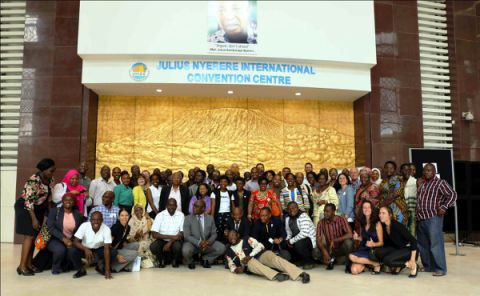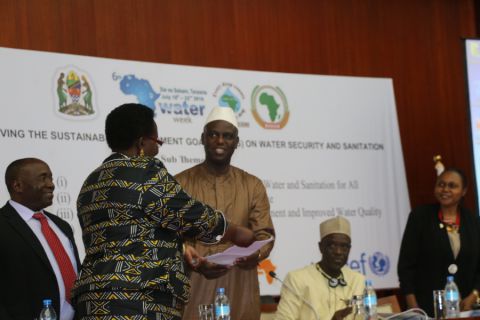Recently I was lucky to be a participant, along with a group of nearly 100 civil society representatives, who gathered for the African Civil Society Forum, ahead of the 6th African Water Week in Tanzania. Africa Water Week is a biennial conference bringing together government representatives and Water Ministers from around the African region, organised by the African Ministers’ Council on Water (AMCOW). This conference is the only platform on the continent that brings together a range of stakeholders, including governments, donors, practitioners and civil society in the water and sanitation sector.
My main priority of attending the 6th Africa Water Week was to make sure that we delivered a successful Civil Society Forum, as End Water Poverty was one of the co-convenors of the Forum. Led by the African Civil Society Network on Water and Sanitation (ANEW), co-convenors included End Water Poverty, WaterAid, the Water Supply and Sanitation Collaborative Council (WSSCC), Sanitation and Water for All (SWA) and IRC. The way and manner the co-convenors, and all other participants, threw their energy and resources in organising this forum was incredible. We all worked well together to support representatives from civil society and community organisations from forty countries to attend the conference – a great feat to ensure strong civil society participation. Held on the Saturday before Africa Water Week itself, the Forum provided an exciting opportunity to unite civil society and establish a common advocacy position, calling for governments to realise their commitments and achieve the human rights on water and sanitation. It was also an important opportunity to discuss a renewed strategy for ANEW and plans to strengthen the African civil society network.

Group shot of all civil society representatives at the African Civil Society Forum, July 2016.
The forum was a success in terms of political buy-in from AMCOW and arriving at consensus on the final civil society position statement and key issues that Africa Water Week need to address. None other than Bai-Mass Tall, the Executive Secretariat of AMCOM himself, along with Sylvester Matemu, the Assistant Director at the Tanzania Ministry of Water and Irrigation, delivered the keynote speeches at the opening of the Forum. Bai-Mass’s message was encouraging and uplifting, as he recounted on how, under his leadership, he has encouraged and ensured civil society participation in AMCOW’s work, through activities such as actively supporting ANEW to undertake advocacy on the continent. He was very passionate about civil society and the valuable contribution it makes to ensuring we achieve our common vision of water and sanitation for all. He felt that civil society working in Africa were central in the implementation and realisation of Goal 6 on water and sanitation of the new Sustainable Development Agenda. Matemu also praised the work of civil society in Tanzania, particularly the national WASH umbrella platform the Tanzanian Water and Sanitation Network – TaWaSaNET. He promised to continue to work closely with civil society organisations and representatives in his capacity as chair of AMCOW’s Technical Advisory Committee. This is a great opportunity for us to get our voices heard!
Before the Civil Society Forum, I was worried whether we – as civil society representing a range of interests – could come to agreement about key issues to take to the Conference. I have been to other conferences where this was not the case; where consultation processes created a sense of mistrust and problematic ways of working, which continued for years. However, thanks to the clarity of the insightful presentations and fantastic participants, unanimous decisions were made, particularly around the particular issues to include in the official statement civil society would present to AMCOW and government representatives at the opening ceremony of the conference.
On Monday 18 July, at the Opening Plenary on Africa Water Week, Doreen Wandera from Uganda, in her role as Chair of ANEW, presented the final civil society statement. Every single member of civil society in the audience was proud of our achievement and our declaration. It moved Bai-Mass to ask Doreen to officially present our statement to the President of AMCOW on behalf of civil society. The conference hall broke into a spontaneous applause.
Doreen Wandera handing the civil society statement to the president of AMCOW, July 2016.
I just couldn’t believe it! I told my colleagues our work was done for the week. After the opening plenary, throughout the remainder of the week, there were many technical sessions and workshops which I will blog about in a separate piece. I am happy to say that about 50% of the civil society statement was included in the final communique. The table below clearly shows what civil society called for on 16 July and what was in the final Africa Water Week communique on 21 July.
On 16 July civil society working in Africa called for the following:
On 21 July Africa Water Week communique wording agreed:
Ensure a stronger role for civil society at various levels for coordination, communication and improved accountability in the implementation of Goal 6.
Ensuring a participatory environment for civil society and citizens in policy formulation, sector planning and monitoring.
Increase domestic resource mobilisation – and improve allocation and utilisation – to achieve sustainable service delivery and performance, by allocating adequate funding for maintenance, rehabilitation and subsequent support to facilities.
Continuously increase budget allocation and domestic resource mobilisation for the water sector as a whole.
Set and meet specific national targets – based on the principles of the human rights to water and sanitation – so that public investments prioritise the poorest and most marginalised, aiming to progressively reduce inequalities, and are focused on areas that have the greatest needs.
Policy and Planning: Ensure coherence in the implementation of our policies in line with the requirements of Agenda 2030 with a focus on, among others; gender, equity and social inclusion.
Establish and invest in a robust, centralised system for data collection and ensure open, accurate, disaggregated data.
In collaboration with Regional Economic Communities, strengthen the framework for standardised monitoring and reporting based on open, accurate and disaggregated data to enable national, regional and global follow-up and review of the progress made towards reaching Africa’s water sector commitments and the SDGs.
What else can I say? I feel like civil society wrote the final communique for AMCOW! While we celebrate this achievement, it is important to recognise that this is the beginning of a fifteen year journey to ensuring that we achieve the ambitious Agenda 2030 and truly leave no one behind. The AMCOW communique will not be worth the ink and paper or memory space on which it will be written, or stored, if it is not translated into action. Civil society have an important role to play in getting national governments to translate these lofty ideals into services for the poor and marginalised, and we will continue to lobby their governments to develop clear implementation plans.
Resources:
Visit our recent news story on African Water Week to download the final position statement from Africa Civil Society.
And download the final communique from AMCOW:
Final Communique – Dar es Salaam Roadmap on Water Security and Sanitation
Final Communique – Dar es Salaam Roadmap on Water Security and Sanitation
